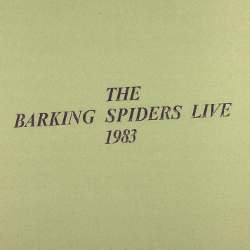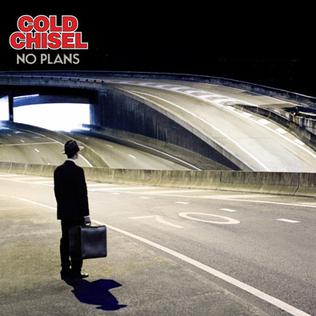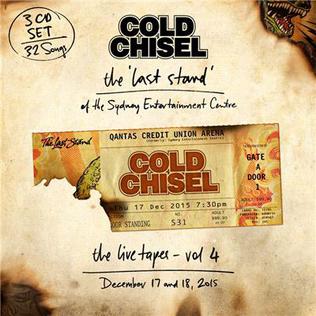
Cold Chisel are an Australian pub rock band, which formed in Adelaide in 1973 by mainstay members Ian Moss on guitar and vocals, Steve Prestwich on drums and Don Walker on piano and keyboards. They were soon joined by Jimmy Barnes on lead vocals and, in 1975, Phil Small became their bass guitarist. The group disbanded in late 1983 but subsequently reformed several times. Musicologist Ian McFarlane wrote that they became "one of Australia's best-loved groups" as well as "one of the best live bands", fusing "a combination of rockabilly, hard rock and rough-house soul'n'blues that was defiantly Australian in outlook."

"Khe Sanh" is the debut single by Australian rock band Cold Chisel, released in May 1978 as a 45 rpm single, and named after the district capital of Hướng Hóa District, Quảng Trị Province, Vietnam. Written by pianist Don Walker, "Khe Sanh" concerns an Australian Vietnam veteran dealing with his return to civilian life. According to Toby Creswell's liner notes for the band's 1991 compilation album Chisel, the song is also a story of restless youth.

"Flame Trees" is a song by Australian pub rock band Cold Chisel from their 1984 album Twentieth Century. One of their best known songs, it was written by drummer Steve Prestwich and keyboardist Don Walker. On its release it reached No. 26 on the Kent Music Report Singles Chart. It resurfaced in August 2011 due to download sales, peaking at No. 54 on the ARIA chart.

Breakfast at Sweethearts is the second studio album by Australian pub rock band Cold Chisel, released in February 1979. It spent 32 weeks in the national charts, reaching a peak of number 4.

Cold Chisel is the debut album of Australian pub rock band Cold Chisel. Released in April 1978, it spent 23 weeks in the Australian charts, peaking at number 38.

Chisel is a compilation album by Australian pub rocker band Cold Chisel, released in September 1991. It features a selection of their best songs from previous albums, including live versions of the tracks "Bow River", "Merry-Go-Round," "Star Hotel" and "Goodbye ." The track "Misfits" was previously a B-side and was removed from later re-issues of this album. A limited edition release of this album included the long-deleted 1978 live EP You're Thirteen, You're Beautiful, and You're Mine.

You're Thirteen, You're Beautiful, and You're Mine is a live EP by Australian pub rock band Cold Chisel, recorded at the Regent Theatre in Sydney in October 1978, and released in November. After a long period of unavailability, the EP was re-released as a bonus disc with the second pressing of the compilation album Chisel (1991). The EP was later made available digitally, as well as reissued on disc in 2011.

East is the third studio album by Australian pub rock band Cold Chisel, released in June 1980. The album peaked at No. 2 and spent 63 weeks on the national chart. It was the biggest-selling Australian album release of the year. It was the only Cold Chisel album to chart in America, reaching 171 on the Billboard 200. It also reached number 32 on the New Zealand charts.

Circus Animals is the fourth studio album by Australian band Cold Chisel, released on 8 March 1982. It was recorded and mixed at Paradise Studios and EMI Studios 301, Sydney, between September and December 1981. It reached number one on the Australian charts, remaining in the charts for 40 weeks, and also topped the New Zealand charts. The working title for the album was "Tunnel Cunts".

Swingshift is a live album released by Australian band Cold Chisel in 1981. It was their first album to reach No. 1 on the Australian chart, debuting there in its first week. It peaked at number 9 in New Zealand. A press release said the title referred to, "the midnight to dawn shift that the staff in asylums dread: the hours when the crazies go crazy."

Twentieth Century is the fifth and final studio album by Australian band Cold Chisel until the group reformed in 1998. The album was written and recorded over various sessions during the period of the band's break-up and during breaks in their final tour. It was released in early 1984 and peaked at No. 1 on the Australian albums chart, their third consecutive album to do so. It charted for a total of 46 weeks.
Last Stand is a documentary film of the final concert appearances by Australian rock band, Cold Chisel, prior to their first disbandment. It was filmed on 13 and 15 December 1983 at the Sydney Entertainment Centre and released to cinemas in July 1984. It featured the group performing two of the four final concerts of their national Last Stand Tour, from 12 to 15 December 1983. It is interspersed with short interviews from members of the band, their managers, audience members and Midnight Oil front man, Peter Garrett. A DVD version featuring extra footage was issued in October 2005.

The Barking Spiders Live: 1983 is a live album by Australian rock band Cold Chisel. It was recorded during the final performances of their Last Stand tour in 1983, at the Sydney Entertainment Centre. The name of the album derives from a name the band used occasionally when playing warm-up shows before tours. Don Walker states a "barking spider" is "Scottish slang for a fart."

"Saturday Night" is a 1984 single from Australian rock band Cold Chisel, the second released from the album Twentieth Century and the first to be issued after the band's official break-up. The vocals are shared between Ian Moss and Jimmy Barnes. It just missed out on becoming the band's third Top 10 single, stalling at number 11 on the Australian chart for two weeks, but it remains one of Cold Chisel's highest charting songs.
"My Baby" is a 1980 single from Australian rock band Cold Chisel, the third released from the album East and the first of the band's singles not to be written by pianist Don Walker. This was the only track credited solely to bass player Phil Small on any of the band's albums apart from "Notion For You" on the 1994 rarities album Teenage Love.

"You Got Nothing I Want" is a 1981 single from Australian rock band Cold Chisel, the first released from the album Circus Animals. One of the band's heaviest and most aggressive songs, which was written by singer Jimmy Barnes in response to the treatment they received at the hands of a record company executive during a U.S. tour earlier in the year. Don Walker said, "After we came back, Jim wrote 'You Got Nothing I Want' more or less as a personal tribute to Marty Schwartz." "You Got Nothing I Want" was also the first song on the album, and representative of the different sound Cold Chisel was attempting on Circus Animals in a conscious effort to move away from the slick commercial pop rock of East. It spent 19 weeks in the national charts, peaking at number 12.

No Plans is the seventh studio album by Australian rock band Cold Chisel. It was released on 6 April 2012 and was the band's first studio album in 14 years. It features the final recorded performances by drummer Steve Prestwich, who died of a brain tumour in January 2011. The album peaked at number 2 on the Australian charts.

"Cheap Wine" is a 1980 single from Australian rock band Cold Chisel. The second single from the album East, it was released in May, a month before the album. It reached number 8 on the Australian charts, the band's first top-ten single, and would eventually remain the band's second highest chart performance. It has been described as, "one of Don's finest commercial songs."

Radio Songs: A Best of Cold Chisel is the second greatest hits collection by Australian pub rock band Cold Chisel, and first compilation released in Australia. The album was released in 1985. It included tracks from their first five studio albums, Cold Chisel, Breakfast at Sweethearts, East, Circus Animals and Twentieth Century.

The Live Tapes Vol. 4, or more fully The Live Tapes Vol 4: The Last Stand of the Sydney Entertainment Centre, December 17 & 18, 2015, is a live album by Australian rock band Cold Chisel. It was recorded at the Sydney Entertainment Centre on 17 and 18 December 2015, which ended the group's One Night Stand tour of Australia. The band dubbed these performances "The Last Stand" of the venue, prior to its demolition. Upon announcement of the two shows, over 20,000 tickets were sold in 10 minutes. The album was launched on the grass of Hobart's Wrest Point Hotel Casino on 22 November. The Live Tapes Vol. 4 was released in various formats on 10 November 2017 as the fourth of a five-part series of live recordings unearthed from Cold Chisel's own archives. It reached No. 9 on the ARIA Albums chart.


















